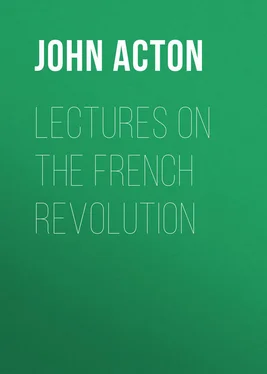John Acton - Lectures on the French Revolution
Здесь есть возможность читать онлайн «John Acton - Lectures on the French Revolution» — ознакомительный отрывок электронной книги совершенно бесплатно, а после прочтения отрывка купить полную версию. В некоторых случаях можно слушать аудио, скачать через торрент в формате fb2 и присутствует краткое содержание. Жанр: foreign_antique, foreign_prose, Историческая проза, на английском языке. Описание произведения, (предисловие) а так же отзывы посетителей доступны на портале библиотеки ЛибКат.
- Название:Lectures on the French Revolution
- Автор:
- Жанр:
- Год:неизвестен
- ISBN:нет данных
- Рейтинг книги:4 / 5. Голосов: 1
-
Избранное:Добавить в избранное
- Отзывы:
-
Ваша оценка:
- 80
- 1
- 2
- 3
- 4
- 5
Lectures on the French Revolution: краткое содержание, описание и аннотация
Предлагаем к чтению аннотацию, описание, краткое содержание или предисловие (зависит от того, что написал сам автор книги «Lectures on the French Revolution»). Если вы не нашли необходимую информацию о книге — напишите в комментариях, мы постараемся отыскать её.
Lectures on the French Revolution — читать онлайн ознакомительный отрывок
Ниже представлен текст книги, разбитый по страницам. Система сохранения места последней прочитанной страницы, позволяет с удобством читать онлайн бесплатно книгу «Lectures on the French Revolution», без необходимости каждый раз заново искать на чём Вы остановились. Поставьте закладку, и сможете в любой момент перейти на страницу, на которой закончили чтение.
Интервал:
Закладка:
Their victory brought loss as well as gain to the Commons, and there was reason to think that the counsel of Sieyès, to let the other orders take their own separate course, was founded on wisdom. Their opponents, joining under compulsion, had the means as well as the will of doing them injury.
For the clergy there was a brief season of popular favour. The country priests, sprung from the peasantry, and poorly off, shared many of their feelings. The patronage of the State went to men of birth; and one of these, the Archbishop of Aix, had proclaimed his belief that, if anybody was to be exempt from taxation, it ought to be the impoverished layman, not the wealthy ecclesiastic. When it chanced that the Committee of Constitution was elected without any member of the clergy upon it, the Commons raised a cry that they should be introduced in their proportion. They, in a fraternal spirit, refused. And the second Committee, the one that actually drew up the scheme, was composed of three churchmen to five laymen. The nobles were not reconciled, and refused to unite with men of English views in a Tory party. To them, the separation of orders was a fundamental maxim of security, which they had inherited, which they were bound to hand down. They looked on debate in common as provisional, as an exception, to be rectified as soon as might be. They kept up the practice of also meeting separately. On July 3 there were one hundred and thirty-eight present; and on the 11th there still were eighty. They refused to vote in the divisions of the joint Assembly, because their instructions forbade. The scruple was sincere, and was shared by Lafayette; but others meant it as a protest that the Assembly was not lawfully constituted. Therefore, July 7, Talleyrand moved to annul the instructions. They could not be allowed to control the Assembly; they ought not to influence individuals. The constituencies contribute to a decision; they cannot resist it. Whatever the original wish of the electors, the final act belonged to the legislature. The king himself, on June 27, had declared the imperative mandates unconstitutional. But the deputies, in declaring themselves permanent, had cut themselves adrift from their constituents. The instructions had become the sole security that the Constitution would remain within the limits laid down by the nation, the sole assurance against indefinite change. They alone determined the line of advance, and gave protection to monarchy, property, religion, against the headlong rush of opinion, and the exigencies of popular feeling.
Sieyès, who expected no good from the co-operation of the orders which he condemned, and who thought a nobleman or prelate who did not vote better than one who voted wrong, urged that the question did not affect the Assembly, but the constituencies, and might be left to them. He carried his amendment by seven hundred to twenty-eight.
Meantime the party that had prevailed on June 23 and had succumbed on the 27th was at work to recover the lost position. Lewis had retained the services of Necker, without dismissing the colleagues who baffled him. He told him that he would not accept his resignation now, but would choose the time for it. Necker had not the acuteness to understand that he would be dismissed as soon as his enemies felt strong enough to do without him. A king who deserted his friends and reversed his accepted policy because there was no force he could depend on, was a king with a short shrift before him. He became the tool of men who did not love him, and who now despised him.
The resources wanting at the critical moment were, however, within reach, and the scheme proposed to the Count d'Artois by the wily bishop a few nights before was revived by less accomplished plotters. On July 1 it became known that a camp of 25,000 men was to be formed near Versailles under Marshal de Broglie, a veteran who gathered his laurels in the Seven Years' War, and soon the Terrace was crowded with officers from the north and east, who boasted that they had sharpened their sabres, and meant to make short work of the ambitious lawyers, the profligate noblemen, and unfrocked priests who were ruining the country.
In adopting these measures the king did not regard himself as the originator of violence. There had been disturbances in Paris, and at Versailles the archbishop of Paris had been assaulted, and compelled to promise that he would go over to the Assembly. The leader on the other side, Champion de Cicé, archbishop of Bordeaux, came to him, and entreated him not to yield to faction, not to keep a promise extorted by threats. He replied that he had given his word and meant to keep it.
Forty years later Charles X. declared that his brother had mounted the scaffold because, at this juncture, he would not mount his horse. In truth Lewis believed that the deputies, cut off from Paris by visible battalions, would be overawed, that the army of waverers would be accessible to influence, to promises, remonstrances, and rewards, that it would be safer to coerce the Assembly by intimidation than to dissolve it. He had refused to listen to Talleyrand; he still rejected the stronger part of his scheme. By judicious management he hoped that the Assembly might be brought to undo its own usurping and unwarranted work, and that he would be able to recover the position he had taken up on June 23, the last day on which his policy had been that of a free agent.
Necker knew no more than everybody else of the warlike array. On July 7 thirty regiments were concentrated; more were within a few days' march, and the marshal, surrounded by an eager and hurried staff, surveyed his maps of suburban Paris at his headquarters at Versailles.
The peril grew day by day, and it was time for the Assembly to act. They were defenceless, but they relied on the people of Paris and on the demoralisation of the army. Their friends had the command of money, and large sums were spent in preparing the citizens for an armed conflict. For the capitalists were on their side, looking to them to prevent the national bankruptcy which the Court and the nobles were bringing on. And the Palais Royal, the residence of the Duke of Orleans, was the centre of an active organisation. Since the king had proved himself incompetent, helpless, and insincere, men had looked to the Duke as a popular prince of the Blood, who was also wealthy and ambitious, and might avail to save the principle of monarchy, which Lewis had discredited. His friends clung to the idea, and continued to conspire in his interest after the rest of the world had been repelled by the defects of his character. For a moment they thought of his son, who was gifted for that dangerous part as perfectly as the father was unfit, but his time was to be in a later generation.
The leading men in the Assembly knew their position with accuracy, and did not exaggerate the danger they were in. On July 10 their shrewd American adviser, Morris, wrote: "I think the crisis is past without having been perceived; and now a free Constitution will be the certain result." And yet there were 30,000 men, commanded by a marshal of France, ready for action; and several regiments of Swiss, famed for fidelity and valour, and destined, in the same cause, to become still more famous, were massed in Paris itself under Besenval, the trusted soldier of the Court.
On July 8, breaking through the order of debate, Mirabeau rose and the action began – the action which changed the face of the world, and the imperishable effects of which will be felt by every one of us, to the last day of his life. He moved an address to the king, warning him that, if he did not withdraw his troops, the streets of Paris would run blood; and proposing that the preservation of order should be committed to a civic guard. On the following day the Assembly voted the address, and on the 10th the Count de Clermont Tonnerre, at the head of a deputation, read it to the king. On the morning of Saturday, 11th, his reply was communicated to the Assembly. He had had three days to hasten his military preparations. At Paris, the agitators and organisers employed the time in arranging their counter measures.
Читать дальшеИнтервал:
Закладка:
Похожие книги на «Lectures on the French Revolution»
Представляем Вашему вниманию похожие книги на «Lectures on the French Revolution» списком для выбора. Мы отобрали схожую по названию и смыслу литературу в надежде предоставить читателям больше вариантов отыскать новые, интересные, ещё непрочитанные произведения.
Обсуждение, отзывы о книге «Lectures on the French Revolution» и просто собственные мнения читателей. Оставьте ваши комментарии, напишите, что Вы думаете о произведении, его смысле или главных героях. Укажите что конкретно понравилось, а что нет, и почему Вы так считаете.












